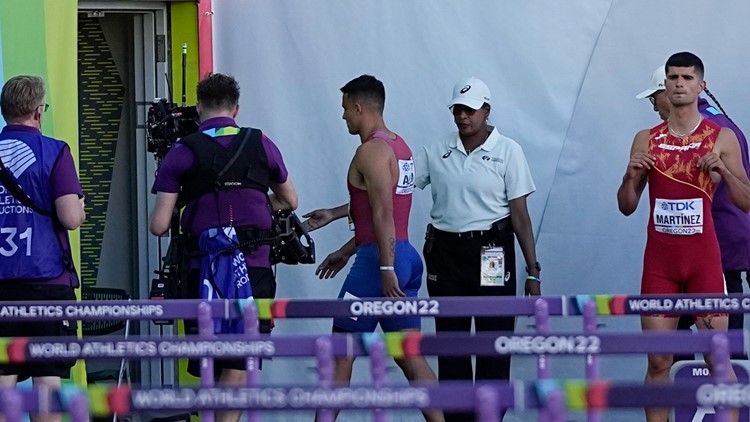EUGENE, Ore. — Hurdler Devon Allen did not jump before the starting gun. He got disqualified for a false start anyway. That sent parts of the track and field world — and also the NFL world that he will be part of soon — into a frenzy.
Allen's DQ for a false start in the 110-meter hurdles came Sunday night and put a slight damper on an otherwise otherworldly performance by the United States at world championships in Eugene, Oregon. The Americans won nine medals — a record for one day. It could've been 10 had Allen been allowed to run the race.
A rundown of what happened:
Q: Did Allen really leave the starting blocks too early?
A: Depends on the definition of early. The sensors in the starting blocks measure what's called “reaction time,” which is the amount of time it takes for a runner's foot to leave the block after the starting gun goes off. Obviously, if a runner leaves the starting block before the gun goes off, it's an easy call. But there is also a rule that says it's a false start if a runner leaves within 0.1 seconds AFTER the gun sounds — the idea being that nobody could possibly react that quickly to the gun.
Q: What happened with Allen?
A: His reaction time was measured at 0.099 seconds. That's one-thousandth of a second too fast. He lingered near the starting line after receiving his red card, and looked at the replay in a monitor in the infield. Ultimately, though, rules are rules, and Allen went back underneath the stadium to watch Grant Holloway win the gold medal.
Q: Is this rule fair?
A: There was a flurry of activity on social media saying it wasn't. One element that stands out: In the semifinals, Allen's reaction time was 0.101 seconds — an indication that either he got very lucky that time. Or, given what happened a few hours later in the final, that quite possibly, an athlete who starred as a wide receiver at Oregon and is getting a tryout with the Philadelphia Eagles, has some otherworldly reflexes that even those who line up next to him on the track don't often match.
Q: What about those starting blocks?
A: In an almost comical episode last year at Olympic trials in the same stadium, nine restarts were needed on a single day — five in the 110 hurdles and four in the women's 400 hurdles — because of malfunctions in the starting blocks. No one was disqualified. There was no word on whether the same technology was in place at worlds.
Q: Why didn't Allen get a warning?
A: A first false start used to result in a warning for the entire field, then the next false start resulted in a DQ. But officials changed that rule in 2010, largely because false starts ran rampant and slowed down the pace of the meets. One of the most high-profile victims of the new rule was none other than Usain Bolt, whose false start at the 2011 world championships cost him a chance at the 100-meter title.
Q: What's next for Allen?
A: Training camp with the Philadelphia Eagles, which begins July 26.



